
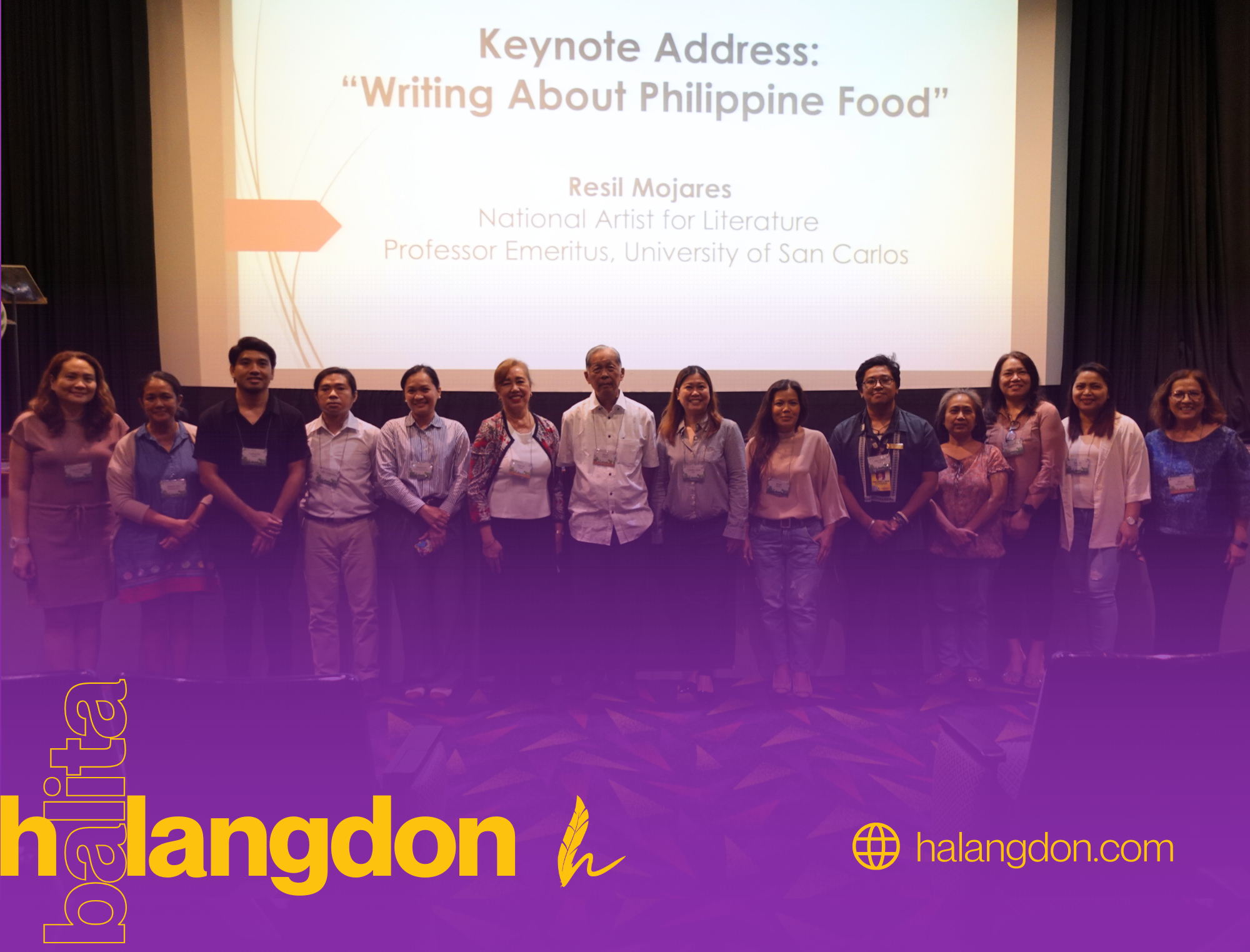
CSC Enlightens Significance of Local Food and Cuisine
- News
- November 19, 2023
- Arcturus Jerome Gonzales
The Cebuano Studies Center hosted a three-day conference titled “Food for Life: Lessons from the Garden” at the SAFAD theater beginning on November 16, 2023.
Sponsored by the National Commission for Culture and the Arts (NCCA) and in cooperation with the Department of Communications, Linguistics and Literature (DCLL) as well as various other academic organizations, the conference was held with the intention of educating Carolinians on how local food and cuisine influences Visayan Societies.
Dr. Resil Mojares, former Director of The Cebuano Studies Center and featured speaker for day one, spearheaded the program with an engaging talk titled “Writing about Food” where he elaborated the history of Regional and National cuisine. He noted the surge of interest in the study of local identity in the 1970s although Food as an academic discipline never took off. Dr. Mojares then went on to cite several important recipe books such as Cocina Sulipeña: Culinary Gems from Old Pampanga by Gene R. Gonzales.
The conference then featured a series of several eminent speakers on Food as a topic on various academic disciplines, such as the “Narrativization of Cebuano Street Food in ‘Street Food Asia’ Docuseries and the Problem of Representativeness” by Genesis Bedio (USC) where he discussed the struggle for identity of Cebuano Street Food due to an overemphasis on ‘excoticsm’ and Ms. Ma An Asunscion (DepEd) in her “Variety of Cebuano Kakanin” in which she presented how local Filipino delicacies such as the famous Chicharon from Carcar or Queseo from Compostela tells a history of the places they are from.
Ending the first day of the program on a high note, Dr. Rowanne Marie Mangompit (CTU) discussed the values associated with Filipino Food in her presentation titled “Food Experiences in Conversations.” such as Pancit symbolizing a long life for its lengthy noodles or how the famous Lechon cemented itself as a symbol of unity because of its historical significance beginning since the Spanish Colonial cuisine.
Carolinians left the SAFAD theater fresh with a new perspective on how local Food and Cuisine can be used as a literary device, a livelihood that can single handedly sustain a community, a condensation of centuries of history, and many more.
“Food can provide a connection to the past as well as to the community and it can transform memory into a sense of pleasure. It can also remind readers to think of food with the complexity that it deserves.”
–Dr. Hope Sabanpan-Yu (USC) Cebuano Studies Center Director
PHOTO GALLERY



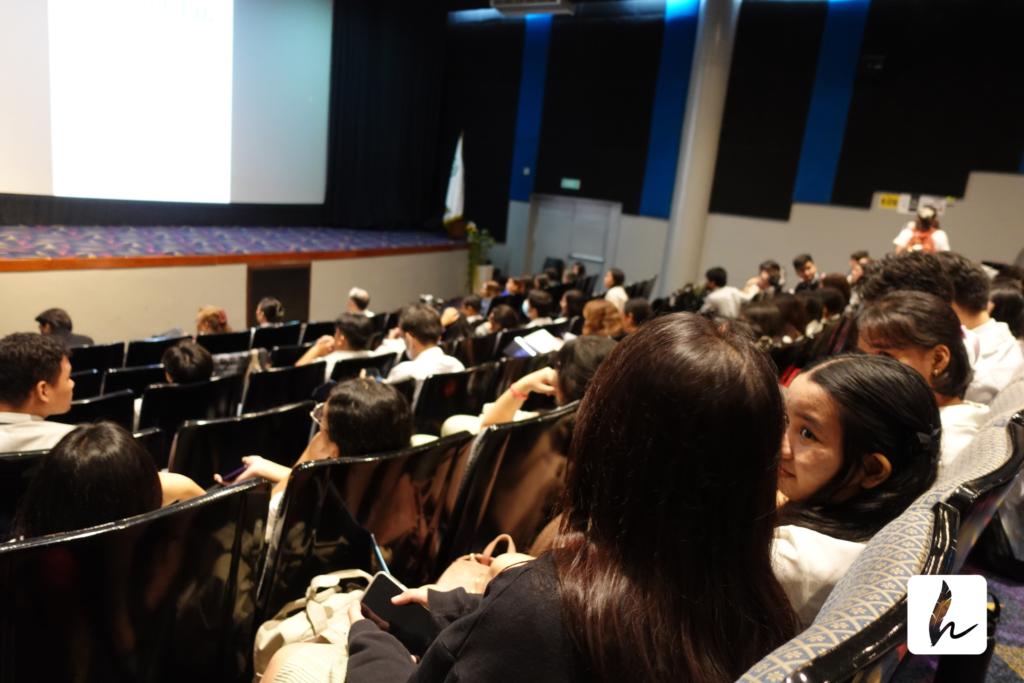
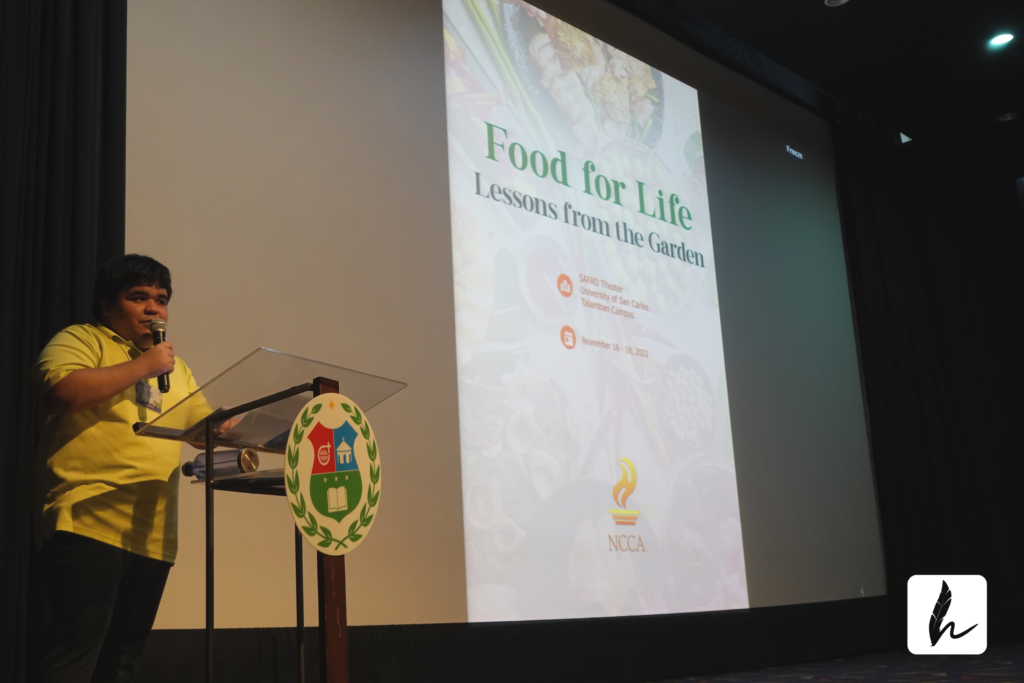
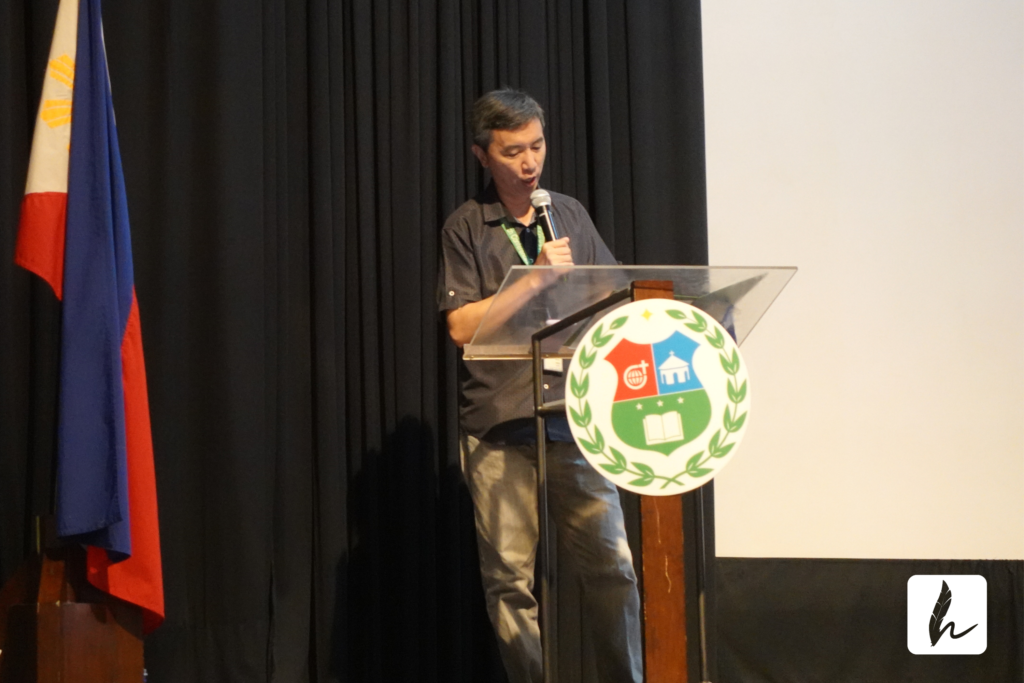

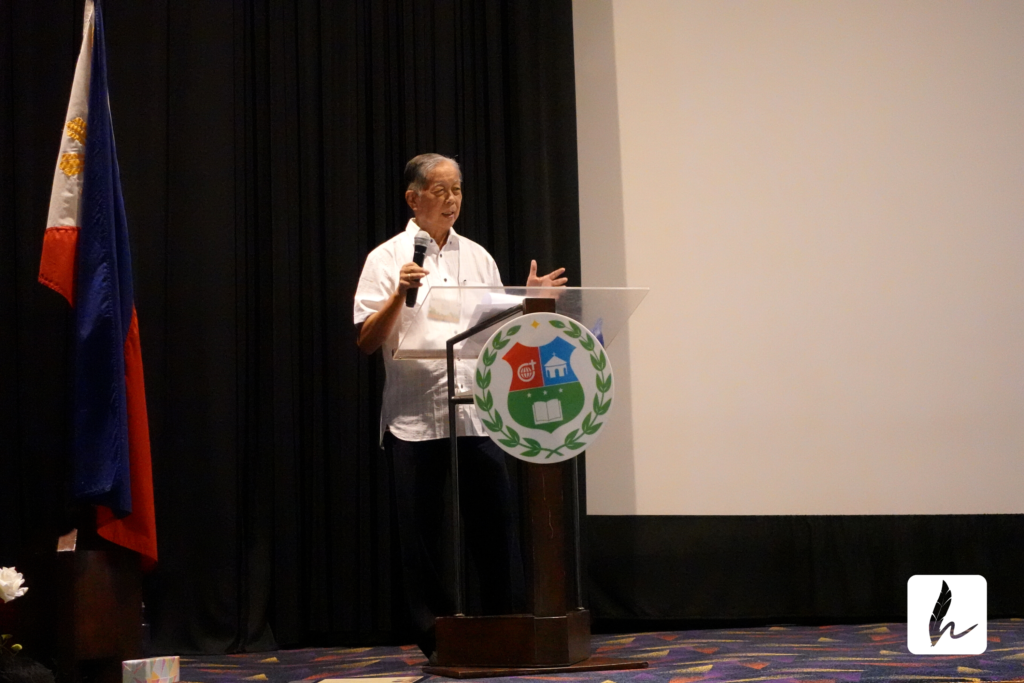
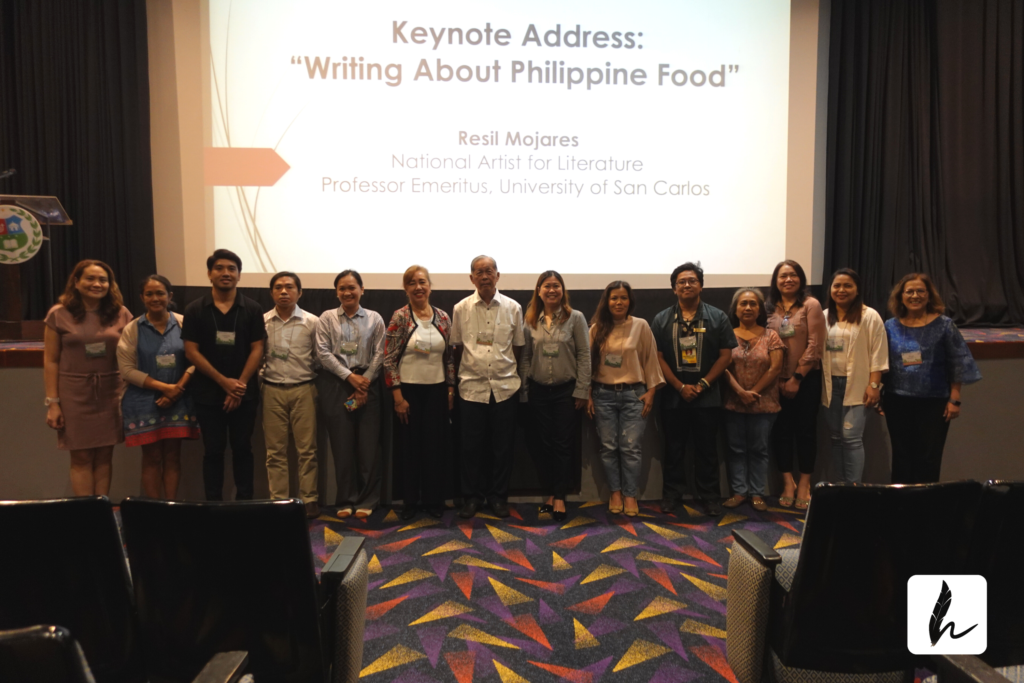

ABOUT THE AUTHOR
Arcturus Jerome Gonzales
Professional Daydreamer
The pursuit of greatness should always be embraced with a little insanity.
READ MORE
06 February 2026
I remember once taking a long walk just to see a place people kept talking about.
It was an uphill hike to the tip of the mountain, a stroll in a forest, roads that pass by small villages and narrow rivers, and lots and lots of potholed roads and gnarled pathways that’d cause a stumble here and there, but promised a sight that would take breaths away.
It was a week-long walk. I wondered why I even started walking.
The path inclined more and more that it felt more like climbing than just walking. The kilometers just increased each day. And the roads just got longer and bumpier the further I went. My legs ached so much that at that point, I couldn’t feel them. I was nauseated, flabbergasted, and dreading every next day that came. The more we continued the camino, the more reason I wanted to go back the way I came from. There was no shortcut, just the road, stretching forward, asking me to continue.
That’s how the year feels so far.
28 December 2025
On the 19th of November,
leaves retreat from the branches,
struggles to find new home amongst the grasses,
its voyage with the wind stucks in memory,
You have you poured,
twigs broken in harmony.
25 December 2025
When love and laughter has exhausted themselves after Christmas Eve, Day, New Year’s Eve, and finally the New Year, I’m left with the memories of it, a standstill of the joy captured, frozen in time. Just like that, party’s officially over. The gifts have been open, the money inside the envelopes evaporated, and the paksiw finally consumed in its entirety. A gaping hole that emerged right after the most festive season, a longing for it to go on forever. Nevertheless, it’s a constant reminder that joy will only ever be appreciated when we’re bombarded with everything else, that it’s spent sparsely, in order for us to appreciate life and the things that come with it, with Christmas being one merry example.
24 December 2025
Every house filled with festive trinkets and a an often wobbly yet earnestly built Christmas tree create a welcome atmosphere to the joyous season; yet, to many people, their homes find genuine warmth by embracing the true mark of the beginning of Christmas through the nine-day observance of Simbang Gabi or Mass at Dawn. But why is it that the majority of Catholic Filipinos flock to churches at such an early hour? Is it for the supposed wish that would be bestowed on a person should they complete all days of Simbang Gabi? Or is there more to the tradition that families and friends celebrate in the days leading up to Christmas?
16 December 2025
The flawed walkways taught me soon enough,
I am made to be agile and nimble.
It wasn't too hard to memorize the road.
No older than fifteen,
I was told I was small
by the sidewalk that narrowed.
And when September came,
Jose Mari Chan would find his way back.
Singing in new speakers and old radios
notes dancing in the parol workshops
which lined that Old Cabuyao Road.
Stars are waking up then the light glows.
09 December 2025
Behold the Moon on the vigil’s quiet hours,
Silvering the sky amidst the dark nights
Her glow serene above shadowed bowers
And guides souls from the blinding lights.
For the moon is a mirror, so still and clear,
Of the light she bears from the Sun.
A lustre that dims every single murk of fear,
The beacon that points to the face of her Son.
21 November 2025
On November 29, 2023, former US Secretary of State Henry Kissinger passed away at the age of 100. There lies a man known worldwide, which is odd given despite being the topmost position in the executive department behind the president in history’s biggest empire, secretaries of state don’t often get to the fame, or infamy rather, of Kissinger.
03 November 2025
You once asked me how it feels to
live far from home,
and I told you in Cebu, the first
words I learned wasn’t maayong buntag—
but amping.
02 November 2025
We are food for worms, says John Keating in Dead Poets Society. It’s humbling to die, and it’s devastating to be gone and face your own end like the rest of humanity, or even seeing others facing theirs. Sometimes, to grieve is to expect somebody’s return, but a dead person isn’t coming back, so what you could only do is to stare at the tombstone, as if it were to look at a past history.
30 October 2025
The beauty of language lies in its cultural variance, shifting in symbols and intonations across localities and nations. But what becomes of beauty when its met with foreign counterparts? Misunderstanding boils like a bubbling stew. Wars are waged, conflict spits in the face of peace, and blood is spent. Enter translation, where differing tongues find common ground, utilized in various social affairs that span across empires and ages throughout history.
06 February 2026
I remember once taking a long walk just to see a place people kept talking about.
It was an uphill hike to the tip of the mountain, a stroll in a forest, roads that pass by small villages and narrow rivers, and lots and lots of potholed roads and gnarled pathways that’d cause a stumble here and there, but promised a sight that would take breaths away.
It was a week-long walk. I wondered why I even started walking.
The path inclined more and more that it felt more like climbing than just walking. The kilometers just increased each day. And the roads just got longer and bumpier the further I went. My legs ached so much that at that point, I couldn’t feel them. I was nauseated, flabbergasted, and dreading every next day that came. The more we continued the camino, the more reason I wanted to go back the way I came from. There was no shortcut, just the road, stretching forward, asking me to continue.
That’s how the year feels so far.
28 December 2025
On the 19th of November,
leaves retreat from the branches,
struggles to find new home amongst the grasses,
its voyage with the wind stucks in memory,
You have you poured,
twigs broken in harmony.
25 December 2025
When love and laughter has exhausted themselves after Christmas Eve, Day, New Year’s Eve, and finally the New Year, I’m left with the memories of it, a standstill of the joy captured, frozen in time. Just like that, party’s officially over. The gifts have been open, the money inside the envelopes evaporated, and the paksiw finally consumed in its entirety. A gaping hole that emerged right after the most festive season, a longing for it to go on forever. Nevertheless, it’s a constant reminder that joy will only ever be appreciated when we’re bombarded with everything else, that it’s spent sparsely, in order for us to appreciate life and the things that come with it, with Christmas being one merry example.
24 December 2025
Every house filled with festive trinkets and a an often wobbly yet earnestly built Christmas tree create a welcome atmosphere to the joyous season; yet, to many people, their homes find genuine warmth by embracing the true mark of the beginning of Christmas through the nine-day observance of Simbang Gabi or Mass at Dawn. But why is it that the majority of Catholic Filipinos flock to churches at such an early hour? Is it for the supposed wish that would be bestowed on a person should they complete all days of Simbang Gabi? Or is there more to the tradition that families and friends celebrate in the days leading up to Christmas?
16 December 2025
The flawed walkways taught me soon enough,
I am made to be agile and nimble.
It wasn't too hard to memorize the road.
No older than fifteen,
I was told I was small
by the sidewalk that narrowed.
And when September came,
Jose Mari Chan would find his way back.
Singing in new speakers and old radios
notes dancing in the parol workshops
which lined that Old Cabuyao Road.
Stars are waking up then the light glows.
09 December 2025
Behold the Moon on the vigil’s quiet hours,
Silvering the sky amidst the dark nights
Her glow serene above shadowed bowers
And guides souls from the blinding lights.
For the moon is a mirror, so still and clear,
Of the light she bears from the Sun.
A lustre that dims every single murk of fear,
The beacon that points to the face of her Son.
21 November 2025
On November 29, 2023, former US Secretary of State Henry Kissinger passed away at the age of 100. There lies a man known worldwide, which is odd given despite being the topmost position in the executive department behind the president in history’s biggest empire, secretaries of state don’t often get to the fame, or infamy rather, of Kissinger.
03 November 2025
You once asked me how it feels to
live far from home,
and I told you in Cebu, the first
words I learned wasn’t maayong buntag—
but amping.
02 November 2025
We are food for worms, says John Keating in Dead Poets Society. It’s humbling to die, and it’s devastating to be gone and face your own end like the rest of humanity, or even seeing others facing theirs. Sometimes, to grieve is to expect somebody’s return, but a dead person isn’t coming back, so what you could only do is to stare at the tombstone, as if it were to look at a past history.
30 October 2025
The beauty of language lies in its cultural variance, shifting in symbols and intonations across localities and nations. But what becomes of beauty when its met with foreign counterparts? Misunderstanding boils like a bubbling stew. Wars are waged, conflict spits in the face of peace, and blood is spent. Enter translation, where differing tongues find common ground, utilized in various social affairs that span across empires and ages throughout history.
